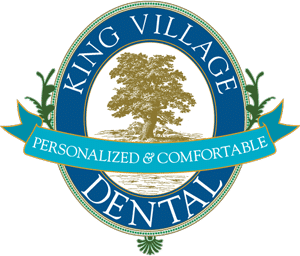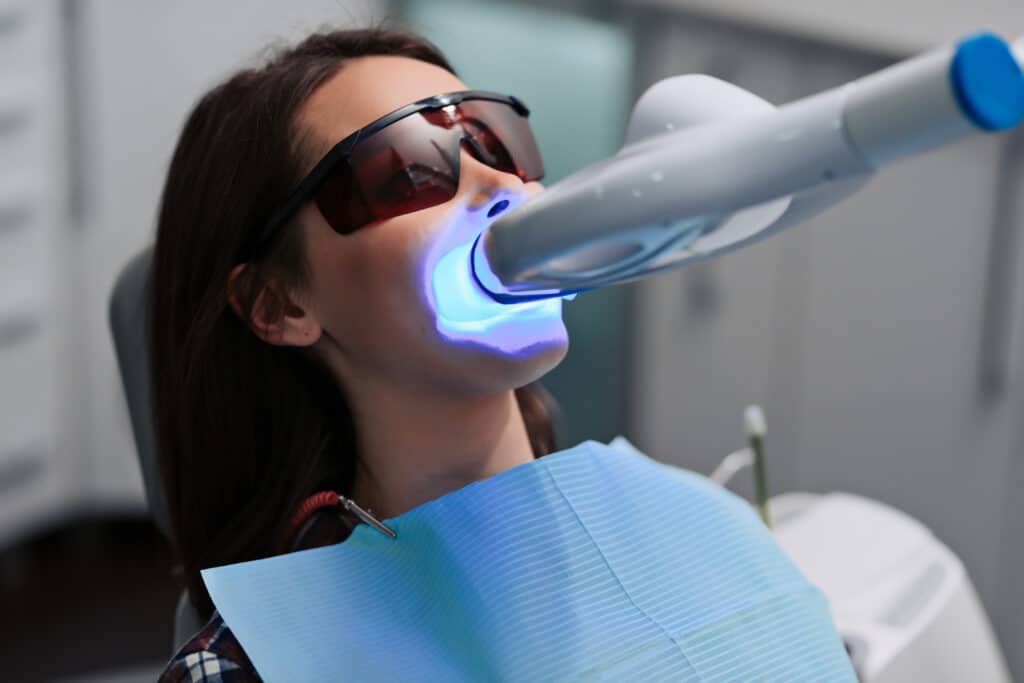People are looking for whiter teeth today and one effective method is laser teeth whitening. Laser teeth whitening is performed in a dental office where a light beam is focused on the mouth where it activates chemicals in a whitening gel that the dentist puts on the teeth. The procedure can be done in an hour and the patient can lighten their teeth by several shades in one session.
Before Getting Laser Teeth Whitening
Laser teeth whitening is considered a cosmetic procedure because it is aesthetic rather than medically necessary for oral health. Dentists put a priority on oral health so they are going to do an exam and check for cavities, decay and gum disease before agreeing to do teeth whitening. Medical oral health issues must be remedied first so that you go into whitening with healthy teeth and gums. This may mean putting off whitening until all those issues are resolved.
The Laser Teeth Whitening Process
The laser teeth whitening process involves five steps. Your teeth will be cleaned and the dentist will put a protective gel on gums so the light doesn’t damage the soft tissue. The dentist will then apply the whitening gel to the front of your teeth. You will be wearing an apparatus that keeps all of your teeth exposed. The apparatus has some slight discomfort but isn’t painful.
The laser light heats the tooth to activate the bleaching agent in the gel. The dentists and staff will monitor your mouth through the laser process to ensure the gause and materials used to protect the soft tissues continue to work. Those tissues should remain dry.
Standard In-Office Whitening vs. Laser Teeth Whitening
People may think that all dentists use laser teeth whitening but that’s not true. The standard in-office whitening process is similar but not the same as laser teeth whitening.
The standard in-office whitening session uses an ultraviolet (UV) light with a light emitting diode (LED) component to activate the whitening gel. It heats up the entire mouth in the activation process. The laser method uses a focused beam to heat up each tooth.
The UV light method is less controlled so there is a higher risk of burns, gum bleeding, and enamel wear with it. It can also have a risk of sunburn, tooth sensitivity, and oral cancer.
What’s in the Whitening Gel?
Whitening gels contain several ingredients and different brands can vary in the exact ingredients. All will have hydrogen peroxide or carbamide peroxide. The hydrogen peroxide is the bleaching agent. Carbamide peroxide is a substance that breaks down into hydrogen peroxide when it mixes with water.
Other ingredients of whitening gel may include potassium nitrate or amorphous calcium phosphate, both which reduces tooth sensitivity, glycerin, and peppermint oil for taste. Glycerin helps to reduce moisture from the teeth so that the gel can go deeper to remove troublesome stains.
Office Laser Teeth Whitening vs. Home Kits
Home teeth whitening kits can do a decent job of whitening but they aren’t going to be as effective as laser teeth whitening from a dentist. Laser teeth whitening gives you immediate results while home kits may take days or weeks to see a significant improvement.
The substances are different too. Home whitening kits are regulated regarding how much hydrogen peroxide they contain. Kits typically have anywhere from 3 to 20 percent hydrogen peroxide in the strips or tray. The gel used by dentists has anywhere from 15 to 43 percent peroxide. The concern has been that home users couldn’t use a stronger peroxide substance safely where it doesn’t damage their teeth. Dentists are trained in using it safely and a stronger whitener is going to yield better results.
Statistics show some home kit users sustain chemical burns to their gums because the chemicals make contact with gums and other soft tissues. That doesn’t happen with a professional dentist who is well trained in the process.
Another difference is an in-office laser teeth whitening session will give you results that last longer than the home whitening kits.
How White Can My Teeth Get?
Dentists will recommend how many shades whiter to go based on the health of your teeth and other factors. A laser teeth whitening session can result in your teeth being up to seven shades whiter! The dentist will go over the different shades with you before your session to decide how light you want your teeth to look.
How Long Will Laser Teeth Whitening Last?
The standard recommendation is for dental patients to come in for another whitening session in a year but many can go up to three years without needing another laser teeth whitening treatment.
Laser Teeth Whitening Safety
Laser teeth whitening is safe for most dental patients. There can be some side effects, especially if it isn’t properly done. The primary concern is teeth sensitivity. Bleaching dehydrates teeth and that can make them sensitive to hot and cold temporarily. This is over in a couple of days.
Gums could be irritated if they aren’t completely protected before the treatment as the chemicals can cause discomfort and the light can cause pain to them.
Pregnant women are advised to put off teeth whitening until after they stop nursing the baby. The chemicals can affect an unborn child and the mother’s breast milk.
Cost
The cost of getting laser teeth whitening varies with each dental office. It can be expensive with the cost ranging between $800 and $1,500 per treatment. One treatment will get your entire mouth white and has long-lasting results. It is more expensive than the standard in-office whitening treatment, which costs between $200 and $1000 per session.
Insurance companies vary on what they pay for whitening. Many don’t pay for it at all because it is a cosmetic treatment. You will need to check your dental insurance to see if it is covered.
Want a smile that lights up a room? Contact us about our laser teeth whitening! We will answer any question and consult with you on your goals for a better smile.

